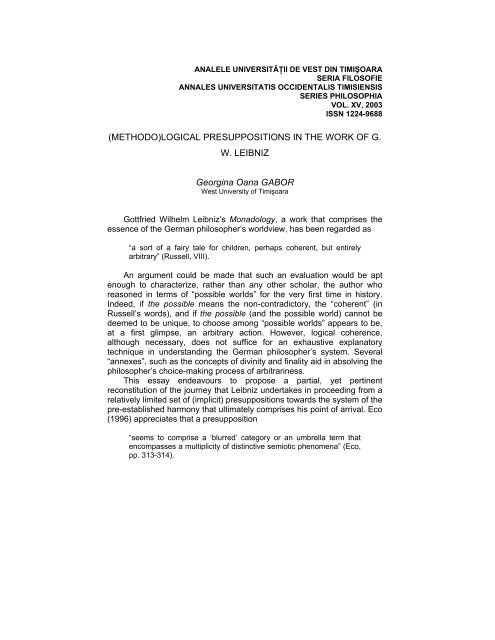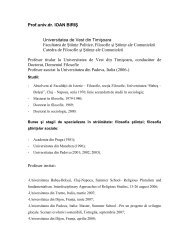analele universităţii de vest din timişoara annales universitatis ...
analele universităţii de vest din timişoara annales universitatis ...
analele universităţii de vest din timişoara annales universitatis ...
Create successful ePaper yourself
Turn your PDF publications into a flip-book with our unique Google optimized e-Paper software.
ANALELE UNIVERSITĂŢII DE VEST DIN TIMIŞOARA<br />
SERIA FILOSOFIE<br />
ANNALES UNIVERSITATIS OCCIDENTALIS TIMISIENSIS<br />
SERIES PHILOSOPHIA<br />
VOL. XV, 2003<br />
ISSN 1224-9688<br />
(METHODO)LOGICAL PRESUPPOSITIONS IN THE WORK OF G.<br />
W. LEIBNIZ<br />
Georgina Oana GABOR<br />
West University of Timişoara<br />
Gottfried Wilhelm Leibniz’s Monadology, a work that comprises the<br />
essence of the German philosopher’s worldview, has been regar<strong>de</strong>d as<br />
“a sort of a fairy tale for children, perhaps coherent, but entirely<br />
arbitrary” (Russell, VIII).<br />
An argument could be ma<strong>de</strong> that such an evaluation would be apt<br />
enough to characterize, rather than any other scholar, the author who<br />
reasoned in terms of “possible worlds” for the very first time in history.<br />
In<strong>de</strong>ed, if the possible means the non-contradictory, the “coherent” (in<br />
Russell’s words), and if the possible (and the possible world) cannot be<br />
<strong>de</strong>emed to be unique, to choose among “possible worlds” appears to be,<br />
at a first glimpse, an arbitrary action. However, logical coherence,<br />
although necessary, does not suffice for an exhaustive explanatory<br />
technique in un<strong>de</strong>rstan<strong>din</strong>g the German philosopher’s system. Several<br />
“annexes”, such as the concepts of divinity and finality aid in absolving the<br />
philosopher’s choice-making process of arbitrariness.<br />
This essay en<strong>de</strong>avours to propose a partial, yet pertinent<br />
reconstitution of the journey that Leibniz un<strong>de</strong>rtakes in procee<strong>din</strong>g from a<br />
relatively limited set of (implicit) presuppositions towards the system of the<br />
pre-established harmony that ultimately comprises his point of arrival. Eco<br />
(1996) appreciates that a presupposition<br />
“seems to comprise a ‘blurred’ category or an umbrella term that<br />
encompasses a multiplicity of distinctive semiotic phenomena” (Eco,<br />
pp. 313-314).




